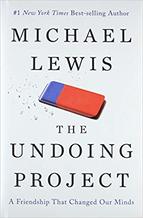 I'm a fan of Michael Lewis's books, and I just finished reading The Undoing Project: A Friendship That Changed Our Minds by Michael Lewis. I had enjoyed his book The Big Short before as well as some of his later ones. This one focused on the unique relationship between Amos Tversky and Daniel Kahneman, who conducted some of the most impactful psychological research over the past 50 years, coining now-famous effects like framing, endowment, and others. Daniel's book Thinking, Fast and Slow was an amazing treatise in psychological research and cognitive biases and errors. This book by Lewis had its focus less on the research and more on the backgrounds of the two protagonists and their intensely creative and productive relationship, as well as the problems it eventually ran into. The title refers to how our minds often use fantasy to try to "undo" parts of reality, and that creates various feelings like frustration, regret, and envy (and how a lot of this wishful thinking is very human but not very rational). I enjoyed the book and reading the stories about how these guys got started, met, and worked together. My full notes are below. Intro
Psychological aspects of the baseball moneyball story 1 man boobs Knowledge is prediction But models limited Confirmation bias Present bias Hindsight bias Endowment effect 2 the outsider Daniel kahneman Incredible memory for textbooks But major emotion was doubt which caused him to go deeper always Jewish upbringing Feeling like he’s a mind without a body Holocaust experience Connoisseur of human memory Writing essays on his own since childhood outside of school Halo effect in interviewing Helping Israeli army analyze candidates in interviews Kahneman score 3 the insider Amos tversky 4 errors Antagonism between thinking and perceiving Cocktail party effect Magical number 7 Chunking Action song to memorize 5 the collision People not good Bayesian statisticians Israeli discussions strong willed and confrontational Very different personalities 6 the mind’s rules Heuristics Representativeness Availability bias Conditionality heuristic Anchoring and adjustment 7 rules of prediction Give yourself a day before accepting invitations Regression to mean Historical judgment Creeping determinism Framing Isolation effect Endowment effect Prospect theory 11 rules of undoing Counterfactual emotions like regret and frustration or envy and how mind considers fantasy Possibilities of undoing Harm to relationship when credit not shared between both Representativensss Psychology versus decision theory People don’t choose between things but between descriptions of things Choice architecture Don’t fantasize about things u want because then don’t work as hard
0 Comments
Your comment will be posted after it is approved.
Leave a Reply. |
Archives
June 2024
Categories
All
Subscribe |
 RSS Feed
RSS Feed
